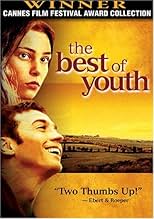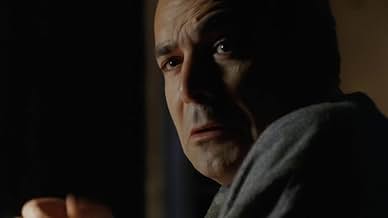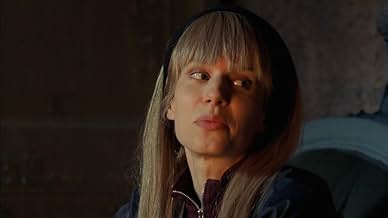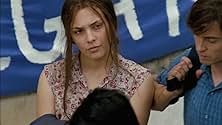An Italian epic that follows the lives of two brothers from the 1960s to the 2000s.An Italian epic that follows the lives of two brothers from the 1960s to the 2000s.An Italian epic that follows the lives of two brothers from the 1960s to the 2000s.
- Director
- Writers
- Stars
- Awards
- 33 wins & 25 nominations total
- Director
- Writers
- All cast & crew
- Production, box office & more at IMDbPro
Featured reviews
Having just returned at 2 am from a festival showing of the movie that started at 5:30, I still can think of nothing but looking for anything and everything about this exceptional film that I came across more or less by accident. I can only sum up two points: it is an excellent yet easy-going overview of recent Italian history, and a truly moving, in an unbanal and unstereotypical, unpopcorny way, movie about the value of friendship, closeness, family. This film makes you want to live, to cherish the people you love and to be aware of the consequences of your acts. City living makes sour cynics out of teenage optimists (I'd count myself in until now), and this one is a lesson of keeping the best of yourself throughout life. A true inspiration! Bravo.
The Best of Youth is a wonderfully scripted, acted, and visually stunning film that will sweep you off your feet and into the lives of an Italian family as they go through the trials and tribulations of life. The film's main focus is on two brothers, Nicola and Matteo Catiti whose personalities are as different as night and day yet is also immediately apparent that these two love each other very much. Nicola is the younger, free spirited and philosophical brother while Matteo is more outspoken, with a hot temper and closed personality.
What I admired most throughout this film was the use and passage of time. Events in Italian history are not crammed into 120 minutes but is instead elongated, as Matteo and Nicola react in their own ways to the events that occur in their country. Time is such an important factor in this film, evidents not only by the six hour running time, but how those six hours are treated. Special occasions occur, yet none are given any special attention. The events that occur are important for that moment in time, yet one pass become mere memories such is the case of life.
With the passage of time, The Best Of Youth became such a moving experience for me. I felt as if I were a part of their family. I could not touch them, or talk to them, yet they seemed to welcome me with open arms as I silently watched their lives unfold before me. I could feel the love this family had for each other as I laughed and cried right beside them. Words just do not seem to be enough to describe the brilliance of this film. It is literally life transferred on screen.
The Best of Youth is remarkably acted and directed. At no time during this film was I bored, because such attention is made to character development, script, and cinematography. In the first part of the film, Nicola is exploring Norway, and sends a postcard to his brother back home telling him of his travels and experiences, and in three words, seems to sum up the film perfectly: "Life is beautiful." After viewing this film, you will share the same perspective.
HIGHLY Recommended
What I admired most throughout this film was the use and passage of time. Events in Italian history are not crammed into 120 minutes but is instead elongated, as Matteo and Nicola react in their own ways to the events that occur in their country. Time is such an important factor in this film, evidents not only by the six hour running time, but how those six hours are treated. Special occasions occur, yet none are given any special attention. The events that occur are important for that moment in time, yet one pass become mere memories such is the case of life.
With the passage of time, The Best Of Youth became such a moving experience for me. I felt as if I were a part of their family. I could not touch them, or talk to them, yet they seemed to welcome me with open arms as I silently watched their lives unfold before me. I could feel the love this family had for each other as I laughed and cried right beside them. Words just do not seem to be enough to describe the brilliance of this film. It is literally life transferred on screen.
The Best of Youth is remarkably acted and directed. At no time during this film was I bored, because such attention is made to character development, script, and cinematography. In the first part of the film, Nicola is exploring Norway, and sends a postcard to his brother back home telling him of his travels and experiences, and in three words, seems to sum up the film perfectly: "Life is beautiful." After viewing this film, you will share the same perspective.
HIGHLY Recommended
"Best of Youth (La Meglio gioventù)" proves that Italians have learned the art of the long-form television mini-series that the British have long mastered.
Covering a somewhat same period of the baby boom generation as "In A Land of Plenty," it has more of the generational feel of individuals caught up in history as we have usually seen in British mini-series about end-of-the-eras or World War I, such as "Brideshead Revisited" and "Jewel in the Crown." U.S. mini-series were more successful as sweeping historical epics, even when they were also family sagas like "Roots" and "Centennial;" when the networks tried to interpret more recent history, as in "The Sixties," the set characters sped through "Zelig" and "Forest Gump"-like in happening to be at the right place at the right time; perhaps the several seasons combined of the NBC series "American Dreams" could be considered comparable in showing how the times that are a-changing affect a family.
"Best of Youth" is being released in the U.S. in movie theaters, though I'm not sure even shown in two parts of three hours each how edited it is from the original format, as other grand European mini-series like "Berlin Alexanderplatz," "Das Boot" and "Fanny and Alexander" were originally only shown in the U.S. in truncated theatrical versions as even PBS seems averse to television with subtitles so we rarely get to see the best of world television. Comparison to the Italian film "The Leopard" is unfair as that was not created in the same format and covers a shorter period of historical time.
"Best of Youth" combines charismatic acting, leisurely directing amidst beautiful scenery in several parts of Italy with writing that takes the trajectories of complex yet consistent characters' lives believably and searingly affected by uniquely Italian experiences of the baby boomers' young adult years through middle age, without the American tendency to reject or regret youthful ambitions, through the lens of local natural disasters, violent political activities, judicial battles against the Cosa Nostra, European economic changes, with regional variations, that Americans rarely see in movies.
The focus is primarily on two brothers from the 1960's almost to the present, played by two actors who must be the equivalent of George Clooney and Richard Chamberlain in Italian television. Alessio Boni in particular as Matteo captures the screen with such tortured macho dynamism that it's no wonder he's gone on to play Heathcliff and Dracula in other mini-series. His Paul Newman-like startling blue eyes become a talking point of the series and a continuing visual leitmotif. Similarly, the physical differences between the two actors help to point up the different paths the brothers take through life, even as the casting of other family members to look like them is eerily effective.
The series is particularly good at capturing the camaraderie amongst old male friends over the years and the intimate interactions of members of a family, particularly with children, with a strong theme of the importance of both as an anchor.
Unlike in American TV where women are adjuncts as the girlfriend/wife/mother, the key women here are crucial fulcrums in the brothers' lives and have separate intellectual, psychological and emotional demands.
The emotions are important here -- grief is shown very movingly, with more pain and tears than American culture usually allows. In one extended scene, we see a grieving mother walk slowly up a long flight of stairs in numbed silence and gradually see her revive as she learns of surprise news about her son.
There are of course some coincidences of family members' and friends' paths crossing at key junctures, but the story overall grips us.
The pop music selections,American, European and Italian, are wonderfully evocative.
Covering a somewhat same period of the baby boom generation as "In A Land of Plenty," it has more of the generational feel of individuals caught up in history as we have usually seen in British mini-series about end-of-the-eras or World War I, such as "Brideshead Revisited" and "Jewel in the Crown." U.S. mini-series were more successful as sweeping historical epics, even when they were also family sagas like "Roots" and "Centennial;" when the networks tried to interpret more recent history, as in "The Sixties," the set characters sped through "Zelig" and "Forest Gump"-like in happening to be at the right place at the right time; perhaps the several seasons combined of the NBC series "American Dreams" could be considered comparable in showing how the times that are a-changing affect a family.
"Best of Youth" is being released in the U.S. in movie theaters, though I'm not sure even shown in two parts of three hours each how edited it is from the original format, as other grand European mini-series like "Berlin Alexanderplatz," "Das Boot" and "Fanny and Alexander" were originally only shown in the U.S. in truncated theatrical versions as even PBS seems averse to television with subtitles so we rarely get to see the best of world television. Comparison to the Italian film "The Leopard" is unfair as that was not created in the same format and covers a shorter period of historical time.
"Best of Youth" combines charismatic acting, leisurely directing amidst beautiful scenery in several parts of Italy with writing that takes the trajectories of complex yet consistent characters' lives believably and searingly affected by uniquely Italian experiences of the baby boomers' young adult years through middle age, without the American tendency to reject or regret youthful ambitions, through the lens of local natural disasters, violent political activities, judicial battles against the Cosa Nostra, European economic changes, with regional variations, that Americans rarely see in movies.
The focus is primarily on two brothers from the 1960's almost to the present, played by two actors who must be the equivalent of George Clooney and Richard Chamberlain in Italian television. Alessio Boni in particular as Matteo captures the screen with such tortured macho dynamism that it's no wonder he's gone on to play Heathcliff and Dracula in other mini-series. His Paul Newman-like startling blue eyes become a talking point of the series and a continuing visual leitmotif. Similarly, the physical differences between the two actors help to point up the different paths the brothers take through life, even as the casting of other family members to look like them is eerily effective.
The series is particularly good at capturing the camaraderie amongst old male friends over the years and the intimate interactions of members of a family, particularly with children, with a strong theme of the importance of both as an anchor.
Unlike in American TV where women are adjuncts as the girlfriend/wife/mother, the key women here are crucial fulcrums in the brothers' lives and have separate intellectual, psychological and emotional demands.
The emotions are important here -- grief is shown very movingly, with more pain and tears than American culture usually allows. In one extended scene, we see a grieving mother walk slowly up a long flight of stairs in numbed silence and gradually see her revive as she learns of surprise news about her son.
There are of course some coincidences of family members' and friends' paths crossing at key junctures, but the story overall grips us.
The pop music selections,American, European and Italian, are wonderfully evocative.
This is a great movie! I thought that all of the acting by every single actor in the movie was just bloody fantastic. I thought that every one of the characters in the movie was very believable and all of them brought me to certain emotions, it was just a great story told in a great way and again what sold it all to me was the great acting by everyone involved from the stars on down to just the supporting bit players who make this movie work. Great big kudos to the director for getting such wonderful performances out of all of these people, I would definitely recommend seeing it to any fan of movies and/or fans of great acting.
10nturner
No, the number of minutes is no typo. This film is over six and a half hours long. But as Roger Ebert says, "I dropped outside of time and was carried along by the narrative flow; when the film was over, I had no particular desire to leave the theater, and would happily have stayed another three hours." Of course, I was watching in the comfort of my home but I agree completely with Mr. Ebert.
The narrative covers the years 1966 through 2003 and focuses primarily upon the older brother of a middle class Italian family. As it begins, the two brothers of the family are ready to pursue college education as an avenue to successful careers. The younger of them is volunteering at a local mental facility as a walker - a companion for patients who need to explore the world outside the institution. He finds that the girl he accompanies is being mistreated and more or less kidnaps her in an attempt to return her to her father's home. In this effort he seeks the help of his brother and the two embark upon an idealistic quest to return the girl to the love and safety of her home. The unhappy result of their venture changes the outlooks of both and sets them on paths which diverge from their original plans. Each chooses a new course which is in conflict with his basic personality. The older brother, who had been practical in all of his previous projects, finds himself diving into an alternative culture, whereas the younger, who had been more footloose, joins the military and eventually becomes a policeman. The encounters of both during the almost forty year span of the film gives us many insightful "what ifs" of two lives and reminds us of the enormous effect sheer chance has upon each of us.
If you are familiar with the Italian political climate and events during the era of this film, your enjoyment will be heightened , but even someone as politically innocent as I had no trouble understanding the conflicts of the major characters that come from diverging ideologies. (I can probably be pretty much assured that if you are a HSC "regular" you are well versed in the politics of Italy in the latter part of the Twentieth Century.) This film has a great "feel" to it in that it doesn't fall into the trap of being overly melodramatic, which is often the bent of films that span long periods of time. I was left with a good feeling at the end but it arose from having viewed the triumphs and tragedies of a very believable family, a family whose members change and grow as a result of their experience of life just as happens in all families no matter their geographic location.
As for geographic location, the viewer of this film is treated to many memorable scenes of Italy from the grit of the city to the blissful pleasures of the islands. The experience is one of a resident of the country rather than a tourist who only has privy to a gossamer view.
If you enjoy excellent film-making and a good story, I have no doubt that you will also be "carried along by the narrative flow" just as Mr. Ebert and I can guarantee you that you will enjoy the ride.
The narrative covers the years 1966 through 2003 and focuses primarily upon the older brother of a middle class Italian family. As it begins, the two brothers of the family are ready to pursue college education as an avenue to successful careers. The younger of them is volunteering at a local mental facility as a walker - a companion for patients who need to explore the world outside the institution. He finds that the girl he accompanies is being mistreated and more or less kidnaps her in an attempt to return her to her father's home. In this effort he seeks the help of his brother and the two embark upon an idealistic quest to return the girl to the love and safety of her home. The unhappy result of their venture changes the outlooks of both and sets them on paths which diverge from their original plans. Each chooses a new course which is in conflict with his basic personality. The older brother, who had been practical in all of his previous projects, finds himself diving into an alternative culture, whereas the younger, who had been more footloose, joins the military and eventually becomes a policeman. The encounters of both during the almost forty year span of the film gives us many insightful "what ifs" of two lives and reminds us of the enormous effect sheer chance has upon each of us.
If you are familiar with the Italian political climate and events during the era of this film, your enjoyment will be heightened , but even someone as politically innocent as I had no trouble understanding the conflicts of the major characters that come from diverging ideologies. (I can probably be pretty much assured that if you are a HSC "regular" you are well versed in the politics of Italy in the latter part of the Twentieth Century.) This film has a great "feel" to it in that it doesn't fall into the trap of being overly melodramatic, which is often the bent of films that span long periods of time. I was left with a good feeling at the end but it arose from having viewed the triumphs and tragedies of a very believable family, a family whose members change and grow as a result of their experience of life just as happens in all families no matter their geographic location.
As for geographic location, the viewer of this film is treated to many memorable scenes of Italy from the grit of the city to the blissful pleasures of the islands. The experience is one of a resident of the country rather than a tourist who only has privy to a gossamer view.
If you enjoy excellent film-making and a good story, I have no doubt that you will also be "carried along by the narrative flow" just as Mr. Ebert and I can guarantee you that you will enjoy the ride.
Discover the nominees, explore red carpet fashion, and cast your ballot!
Did you know
- TriviaOriginally developed as a miniseries for television. It was then released in cinemas in June 2003 as two three-hour films after the uncut six-hour version had been screened to great acclaim at the Cannes Film Festival. It was eventually aired on Italian TV as originally intended, in 4 parts, in November 2003.
- Goofs(at around 27 mins) After a caption has shown that the film is set in 1966 at the beginning and the main characters are getting into a car, a radio is heard playing the song "Might just take your life" by Deep Purple. This song was released in 1974.
- Quotes
Sara Carati, adult: What should I do?
Nicola Carati: I don't know, it depends on how strong you feel... Are you happy now?
Sara Carati, adult: Of course I am!
Nicola Carati: Then, it's time to be generous
- ConnectionsEdited into Colpiti al cuore (2019)
- How long is The Best of Youth?Powered by Alexa
Details
- Release date
- Country of origin
- Official sites
- Languages
- Also known as
- Khoảng Khắc Của Tuổi Trẻ
- Filming locations
- Production companies
- See more company credits at IMDbPro
Box office
- Gross US & Canada
- $274,024
- Opening weekend US & Canada
- $7,490
- Mar 6, 2005
- Gross worldwide
- $2,799,773
- Runtime
- 6h 14m(374 min)
- Color
- Sound mix
- Aspect ratio
- 1.85 : 1
Contribute to this page
Suggest an edit or add missing content




































